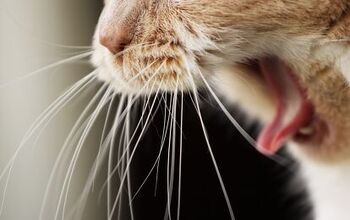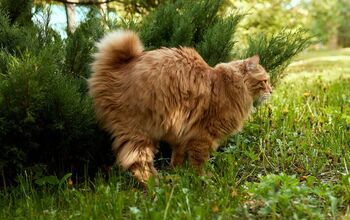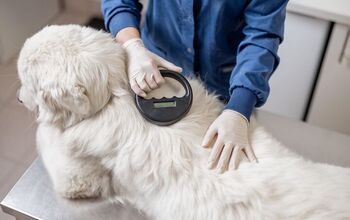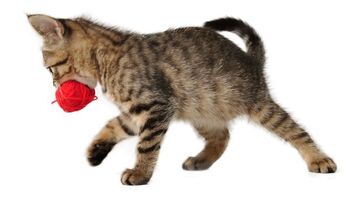Teeth Grinding in Cats: Why It Happens

You already know that people sometimes grind their teeth, but did you know that bruxism can occur in cats, too? This can be caused by pain in the mouth or body, so it is important to have your kitty examined by a veterinarian if you notice the symptoms of bruxism.
What is bruxism in cats, what causes it, and what can be done about it? Keep reading to learn a bit about feline bruxism so you’ll know how to recognize it.
What Are the Symptoms of Teeth Grinding (Bruxism) in Cats?
Teeth grinding in cats will have some obvious signs, and you’ll know that it isn’t normal behavior simply based on what it looks and sounds like. Your cat might grind their teeth while they’re eating or between meals.
When your cat is grinding their teeth, it will look like they are chewing on something even if nothing is in their mouth. You will hear a strange sound, described as a scraping sound, caused by the teeth rubbing against each other. And your kitty might even drool if the grinding is caused by pain or a dental problem.
What Causes Cats to Grind Their Teeth?
Oftentimes, a cat who is grinding their teeth is experiencing mouth discomfort. Problems like tooth resorption, misaligned teeth, loose teeth, broken teeth, and gum disease could be to blame, but there might be other issues, such as inflammation, ulcers, or tumors, in the mouth.
Cats who grind their teeth might also be feeling pain in their jaw, or there might be a problem with the temporomandibular joint (TMJ).
Teeth grinding isn’t always caused by pain associated with the mouth or jaw. A cat might grind their teeth if they feel pain in another part of their body, such as in areas of their digestive tract like the pancreas or stomach. They might even have a neurological condition causing bruxism. Or, they might be feeling stressed or anxious.
These are just some of the many potential causes. Because there are various things that can lead to your cat grinding their teeth, it’s important to have your pet evaluated by a veterinarian who can determine the culprit and provide the appropriate treatment.
Can Teeth Grinding in Cats Be Treated?
A veterinarian can examine your cat and perform diagnostic tests, such as blood tests and dental X-rays, to figure out what’s causing the teeth grinding. Based on their findings, they will come up with a treatment plan, whether it means addressing an oral health issue or an underlying disease.
For example, if a cat’s teeth grinding is caused by tooth resorption or gum disease, a veterinarian who’s skilled in dental procedures and cleanings can help. On the other hand, if it’s determined that your kitty is anxious, you can do things at home to make them feel safe and at ease.
To reduce your cat’s discomfort, your veterinarian might prescribe a pain medication that’s safe for them. Never give your pet over-the-counter pain medications or human pain medications, as these can be toxic to cats.
Are There Ways to Prevent Bruxism in Cats?
Because oral health concerns are common among cats and can cause bruxism, it’s wise to brush your cat’s teeth at home if they’ll tolerate it—only use toothpaste made for cats, not human toothpaste. And keep an eye out for signs that something is wrong with their mouth, such as difficulty chewing food, so you can address the problem promptly. A veterinarian can also examine your pet’s mouth regularly to see if the teeth and gums are healthy.
Giving your cat treats designed to help clean the teeth, such as Feline Greenies Dental Treats, is another good idea. Available in multiple flavors (chicken, salmon, tuna, shrimp, and catnip), these are vet-recommended and have a crunchy texture that helps reduce tartar and clean teeth while freshening breath. Plus, they are nutritionally complete and balanced for adult cats, and don’t contain any artificial flavors or artificial preservatives.
You can also keep your cat healthy, happy, and stress-free by enriching their environment, giving them loads of attention and love, feeding them a high-quality diet, and giving them the chance to let out their energy through play with various toys (including chew toys for their teeth).
Bottom line: if your cat is grinding their teeth, have them checked by a veterinarian to figure out the cause of this abnormal behavior that’s typically associated with pain. With the guidance of a vet, you can get your pet the relief they need.
Join the PetGuide community. Get the latest pet news and product recommendations by subscribing to our newsletter here.

Lisa Selvaggio is a freelance writer and editor, and our resident cats-pert, with certifications in pet nutrition and pet first aid. She enjoys producing content that helps people understand animals better so they can give their pets a safe and happy home.
More by Lisa Selvaggio
























